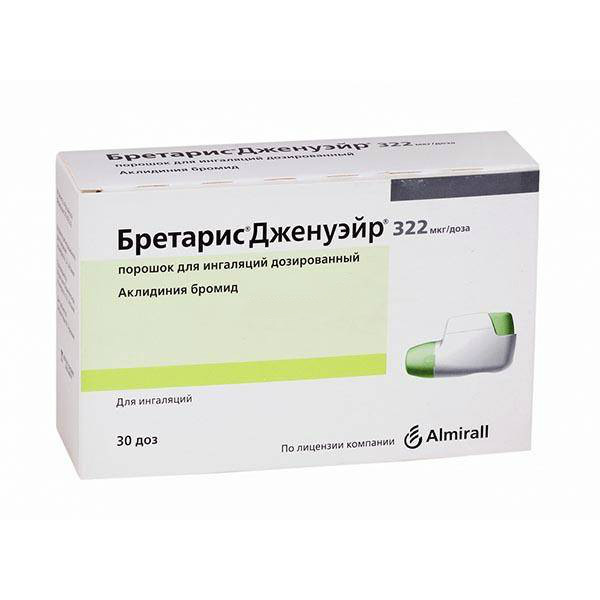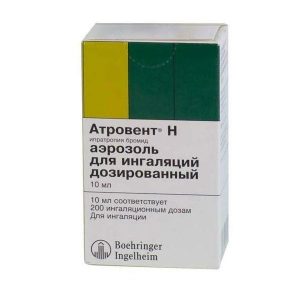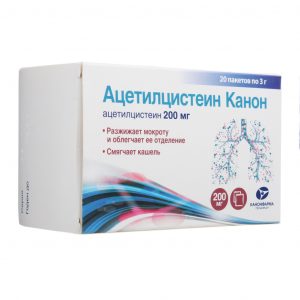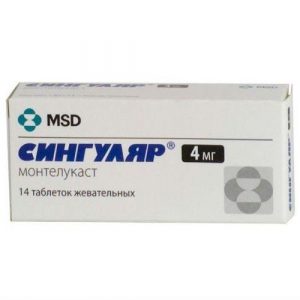Description
Latin name
BRETARIS GENUAIR
1-dose carton packs (1 dose)
Indications
The drug Bretaris ® Genuire ® is intended for supportive bronchodilation therapy to alleviate the symptoms of chronic obstructive pulmonary disease (COPD) in adults.
Contraindications
Hypersensitivity to aclidinium bromide, atropine and its derivatives (ipratropium, oxytropium, or tiotropium) or to lactose.
Under 18 years of age (efficacy and safety not established).
Galactose intolerance, lactase deficiency or glucose-galactose malabsorption (the drug contains lactose).
Pregnancy and lactation
Pregnancy
There are no clinical data on the use of aclidinium bromide in pregnant women. Preclinical studies have shown toxic effects on the fetus only in doses many times higher than the maximum therapeutic dose in humans. Aklidiniya bromide can be used during pregnancy only if the expected benefit to the mother outweighs the potential risk to the fetus.
Breastfeeding period
Unknown Does aklidiniya penetrate bromide and / or its metabolites into breast milk in women. Because preclinical studies have shown that small amounts of aclidinium bromide and / or its metabolites penetrate into milk, it is necessary to decide whether to stop breastfeeding, or to discontinue aclidinium bromide therapy, comparing the benefits of breastfeeding for a child and the benefit of long-term therapy with aclidinium bromide for a woman.
Fertility
Preclinical studies have shown a slight decrease in fertility only at doses many times the maximum therapeutic dose of aclidinium bromide in humans. It is considered unlikely that aclidinium bromide, prescribed in the recommended dose, affects human fertility.
Composition
Active ingredient:
Aklidinia micronized bromide – 0.400 mg *.
Excipient:
? -lactose monohydrate – 12.60 mg.
* A single dose contains 400 mcg of aklidinium bromide, equivalent to 343 mcg of aklidinium. This corresponds to a delivered dose of 375 μg of Aklidinium bromide, which is equivalent to 322 μg of Aklidinium.
Dosage and administration
Introducing the inhaler Bretaris Genuire:
Remove the Genuair inhaler from the package and familiarize yourself with its components.
To use the inhaler Bretaris Jenhair after removing the cap, you need to do 2 steps:
Step 1. Press and release the green button and completely exhale, but not into the inhaler.
Step 2. Grasp the mouthpiece tightly with your lips and inhale strongly and deeply through the inhaler.
After inhalation, be sure to put on the protective cap.
Start
Before first use, open a sealed bag along the label and remove the Genuire inhaler
When you are about to take a dose of the drug, remove the protective cap by squeezing the arrows on each side slightly and pulling out.
Make sure that the mouthpiece is not blocking anything.
Hold the Genoa inhaler horizontally with the mouthpiece toward you, with the green button facing straight up.
Step 1. Press and release the green button.
Do not hold the green button.
Stop and check to see if the dose is ready for inhalation.
Make sure the color control window turns green.
The green color of the control window confirms that the drug is ready for inhalation.
If the color control window remains red, press and lower the green button again (see Step 1).
Step 2. Grasp the mouthpiece of the Jenhair inhaler mouth tightly and inhale deeply and deeply through the mouthpiece.
Such a strong, deep breath delivers the drug through an inhaler to the lungs.
Caution: during inhalation, you cannot hold the device with the green button down.
During inhalation, you will hear a click indicating the correct use of the Januire inhaler.
To make sure that you have taken the entire dose, continue to breathe, even after you hear the click of an inhaler.
Take the Genuhair inhaler out of your mouth and hold your breath for so long as to be comfortable, then exhale slowly through the nose.
Note: some patients, depending on their individual characteristics, may experience a slight sweetish or bitter taste after inhalation of this drug. Do not take an extra dose if you have not felt any taste after inhalation.
Stop and check: Make sure you have inhaled correctly.
Make sure the control window turns red. This confirms that you correctly inhaled the full dose.
If the color control window remains green, you need to inhale again strongly and deeply through the mouthpiece (see Step 2).
If the window still does not change its color to red, then it is possible that you might forget to release the green button before inhalation or you may not breathe correctly. If so, try again.
make sure that you let go of the green button and take a deep, deep breath through the mouthpiece.
Note: if after several attempts you still have not been able to correctly carry out inhalation, consult your doctor.
Once the window turns red, put on the protective cap on the mouthpiece.
When you need a new Genuire inhaler
Generic inhaler is equipped with a dose indicator that shows how many doses are left in the inhaler. The dose indicator slowly drops, showing intervals of up to 10 (60, 50, 40, 30, 20, 10, 0). Each Genweir inhaler contains at least 30 or 60 doses, depending on the type of packaging.
When a tape with red stripes appears on the dose indicator, it means that you are approaching the last dose and you need to purchase a new Genuire inhaler.
note: If your Genuhair inhaler is damaged or if you have lost the cap, replace the inhaler. Genuire inhaler does not need to be cleaned. However, if necessary, this should be done with a dry cloth or paper towel outside the mouthpiece. Never use water to clean the Genuire inhaler, as it can damage the drug.
How do you know if your Genuire inhaler is empty?
When 0 (zero) appears in the middle of the dose indicator, you must continue to use all remaining doses in the Januire inhaler.
When the last dose is prepared for inhalation completely in its upper position, but remains blocked in the middle position. Even when the green button is locked, you can still take the last dose. After that, the Januire inhaler cannot be used again, and you will need to start using the new Genway inhaler.
Side effects
The most common side effects when using the drug Bretaris Januire are headache (6.6%) and nasopharyngitis (5.5%).
The frequency of side effects is based on an estimate of the overall rates of side effects (i.e., events associated with the use of the drug Bretaris Jenhair) observed with the use of the drug Bretaris Jenhair at a dose of 322 mcg (636 patients) in a pool analysis of one 6-month and two 3-month, randomized, clinical trials with placebo control.
The frequency of side effects is defined as follows: very often ( 1/10), often (from 1/100 to
Infectious and parasitic diseases: often – sinusitis, nasopharyngitis.
From the immune system: rarely – hypersensitivity reactions frequency unknown – angioedema.
From the nervous system: often – headache infrequently – dizziness.
From the side of the organ of vision: infrequently – blurred vision.
From the cardiovascular system: infrequently – tachycardia, palpitations.
From the respiratory system, chest and mediastinal organs: often – cough infrequently – dysphonia.
From the gastrointestinal tract: often – diarrhea infrequently – dryness of the oral mucosa, stomatitis.
From the skin and subcutaneous tissues: infrequently – rash, itching.
From the kidneys and urinary tract: infrequently – urinary retention.
Drug Interaction
The concomitant use of aclidinium bromide with other M-blockers has not been studied and is not recommended.
Despite the lack of in vivo studies, the use of aclidinium bromide for inhalation is possible in combination with other drugs for the treatment of COPD, including sympathomimetics, bronchodilators, methylxanthines, and inhalation or oral ACS.
In vitro studies have demonstrated that aclidinium bromide at therapeutic dose or its metabolites do not interact with drugs that are substrates of P-glycoprotein or drugs that are metabolized by cytochrome P450 isoenzymes (CYP450).
Overdose
High doses of aclidinium bromide can lead to symptoms, associated with anticholinergic action.
However, a single inhalation dose of aclidinium bromide up to 6000 mcg in healthy volunteers did not lead to systemic side effects of anticholinergics. There were no clinically relevant adverse events after 7 days of treatment with aclidinium bromide at doses up to 800 mcg 2 times / day in healthy volunteers.
The development of acute intoxication with accidental overdosage of aclidinium bromide is unlikely due to the low bioavailability of oral and inhalation dosing of the drug Bretaris Jenweir.
Treatment: symptomatic.
Storage conditions
The drug should be stored out of the reach of children at a temperature not exceeding 25 ° C. Do not use after the expiration date indicated on the package.
Expiration
Expiration is 2 years. After the first opening of the package – 90 days.
Deystvuyuschee substances
Aklydynyya bromide
dosage form
dosage form
powder for inhalation




